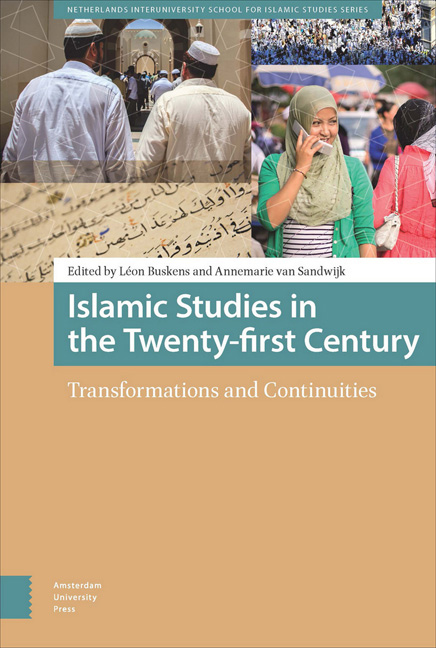Book contents
- Frontmatter
- Dedication
- Contents
- Preface
- Introduction: Dichotomies, Transformations, and Continuities in the Study of Islam
- Islamic Texts: The Anthropologist as Reader
- Textual Aspects of Religious Authority in Premodern Islam
- What to Do with Ritual Texts: Islamic Fiqh Texts and the Study of Islamic Ritual
- Textual Study of Gender
- Scholarship on Gender Politics in the Muslim World: Some Critical Reflections
- Power, Orthodoxy, and Salvation in Classical Islamic Theology
- Dialectical Theology in the Search for Modern Islam
- “Classical” Islamic Legal Theory as Ideology: Nasr Abu Zayd’s Study of al-Shafiʿi’s al-Risala
- Islamic Law in the Modern World: States, Laws, and Constitutions
- Vernacular Cosmopolitanism as an Ethical Disposition: Sufi Networks, Hospitality, and Translocal Inclusivity
- Middle Eastern Studies and Islam: Oscillations and Tensions in an Old Relationship
- Notes on Contributors
- Overview of NISIS Autumn Schools, 2010-2014
- Index
Textual Study of Gender
Published online by Cambridge University Press: 12 December 2020
- Frontmatter
- Dedication
- Contents
- Preface
- Introduction: Dichotomies, Transformations, and Continuities in the Study of Islam
- Islamic Texts: The Anthropologist as Reader
- Textual Aspects of Religious Authority in Premodern Islam
- What to Do with Ritual Texts: Islamic Fiqh Texts and the Study of Islamic Ritual
- Textual Study of Gender
- Scholarship on Gender Politics in the Muslim World: Some Critical Reflections
- Power, Orthodoxy, and Salvation in Classical Islamic Theology
- Dialectical Theology in the Search for Modern Islam
- “Classical” Islamic Legal Theory as Ideology: Nasr Abu Zayd’s Study of al-Shafiʿi’s al-Risala
- Islamic Law in the Modern World: States, Laws, and Constitutions
- Vernacular Cosmopolitanism as an Ethical Disposition: Sufi Networks, Hospitality, and Translocal Inclusivity
- Middle Eastern Studies and Islam: Oscillations and Tensions in an Old Relationship
- Notes on Contributors
- Overview of NISIS Autumn Schools, 2010-2014
- Index
Summary
The early 1990s saw a wave of new scholarship on the history of women and gender in Islamic societies. Some of it reflected the new prominence of politically and religiously engaged women scholars of Muslim and/or Arab background. Some also reflected the increasing application of the methods of gender studies to the relatively conservative fields of Islamic history and law. Works such as Leila Ahmed's Women and Gender in Islam (1992), Fatima Mernissi's The Veil and the Male Elite (first published in English in 1991, translated from a 1987 French original), and Fedwa Malti-Douglas’s Woman's Body, Woman's Word: Gender and Discourse in Arabo-Islamic Writing (1991) surveyed large swathes of Islamic history and thought, suggesting structural connections between gendered religious discourses and the social and political roles and rights of women over time. The work of this period provided the impetus for a large volume of scholarship that, over the following two decades, both expanded and elaborated the theses advanced by these scholars, and ultimately critiqued and refined their approaches. Both the exploitation of a wider source base and the development of more nuanced interpretive frameworks (which, among other things, sometimes questioned the existence of a monolithic “Islamic” gender discourse) have characterised the field in more recent years. In the wake of the influential large-scale syntheses of the early 1990s, more thoroughly documented and contextually specific studies have explored social practices, religious ideology, and the relationship between the two.
The initial problem facing textual scholars interested in the history of gender in premodern Islamic societies is, of course, that of sources. Not only are available sources comparatively sparse, but an overwhelming proportion of them is literary and/or normative in nature. Not only do they reflect ideals and agendas more closely than they do social patterns on the ground, the ideals and agendas they express are usually those of a relatively narrow sector of society. As Judith Tucker observed in a 1993 review article,
Government records, histories, biographical dictionaries, works of jurisprudence, and literature … were almost exclusively authored by members of a male elite of government officials and ʿulamaʾ … Many of these accounts are essentially prescriptive in nature and detail the normative gender system that existed in the minds of an urban male educated elite, not the lived experiences of men as men and women as women.
- Type
- Chapter
- Information
- Islamic Studies in the Twenty-first CenturyTransformations and Continuities, pp. 87 - 108Publisher: Amsterdam University PressPrint publication year: 2017



